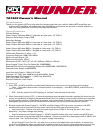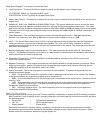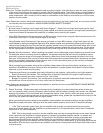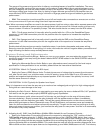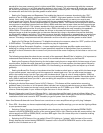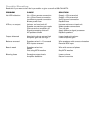Installation
Mounting
Place your Thunder amplifier at the predetermined mounting location. Use a felt pen to mark the exact position
of the mounting holes on the mounting surface. Set the amplifier aside. Then with a sharp, precise blade cut
small circles in the carpet and padding around the four marks denoting your mounting holes to expose the
metal underneath. Use a center punch to make an indentation in the metal to ensure that you drill the exact
position for the screws.
Note: Please use common sense and make sure that all vehicle wires, gas lines, brake lines, etc. are clear and will
not interfere with the installation. ALWAYS WEAR PROPER SAFETY GLASSES.
Connections
1. Bi-Level Inputs (Low/High Level Input) with Smart Engage™ – Both a low and high level signal can be used.
Be sure to lay the signal wire away from all power cables and vehicle computers. Use high quality twisted pair
interconnect cables to decrease the possibility of radiated noise entering the system.
• Using RCA Connections: If the source unit has RCA outputs, simply attach a signal cable from the source unit
to the amp’s RCA input. This will provide signal to the amp.
• Using Speaker Level Connections: If the source unit does not have RCA outputs, a high level signal can be
used instead by taking the supplied high level RCA adapter cables and connecting the bare wire ends to the
vehicle’s rear speaker wiring. Connect the left negative speaker wire to the green with black stripe wire on the
supplied high level RCA adapter. Connect the left positive speaker wire to the solid green wire. Do the same
for the right speaker connection using the purple wire. Now plug the RCA connectors into the amp’s inputs.
2. Speaker Wire Connections – When installing the speaker wires, please take proper measures to protect them.
For example, when connecting the door speakers, the speaker wire should run from the amplifier’s output
terminals, under the carpet, and through the factory rubber boot (loom) that protects the wires in the inner
door jam. If the factory boot cannot be used, take other measures to protect these wires. Sometimes the door
has to be completely removed to use the factory boot. If this is something that you do not feel comfortable
doing, please ask a professional to help you.
When connecting the speaker wires to the amplifier, please observe the printed polarity markings on the
amplifier’s StreetWires connector. Failing to wire the speakers in proper phase could result in a loss of bass
response or poor overall sound quality.
These amps will have four speaker terminals: left positive, left negative, right positive, and right negative.
• Stereo (2-channel) Connection- This configuration is typically used with full range or high frequency
speakers. Each channel can drive a minimum of a 1 ohm load.
• Bridged (1-channel) Connection- This configuration is typically used with subwoofers. Both channels
combined can drive a minimum of a 2 ohm mono load for max power.
Note: Please pay attention and make sure the speakers or woofers are the correct IMPEDANCE (OHMS) BEFORE
attaching to the amplifier.
3. Power Terminals – Please take proper measures during installation to protect the power wires as best you
can. For example, when running the power cable from the vehicle’s battery through the firewall, use a firewall
bushing for protection. Run the power wire through the interior of the vehicle, under the carpet, and to the
amplifier. If this is something that you do not feel comfortable doing, please ask a professional to help you. Be
sure to lay the power wire away from all signal cables.
When connecting the power wires to the amplifier, please observe the printed markings on the amplifier’s
StreetWires power connector. Failing to wire the power cables properly could result in amplifier damage.
• +12V: This is the main power input for the amplifier and must be connected directly to the positive
terminal of the car battery for the amplifier to operate properly. It is important that a main fuse is installed a
maximum of 18” from the battery.
• GND: This is the ground connection for the amplifier and must be connected directly to the metal chassis
of the vehicle for the amplifier to operate properly. A properly grounded amplifier can be run harder and
longer than a poorly grounded amplifier. The ground on the amplifier should be as short as possible and
be connected directly to the vehicle’s metal chassis. Do not connect to factory bolts of ANY kind. When
attaching the ground to the chassis, sand all the paint away from the contact point. A grounding block like the
StreetWires GT4 should be used whenever possible as this piece of equipment has 5 times the surface area of
a normal screw.



